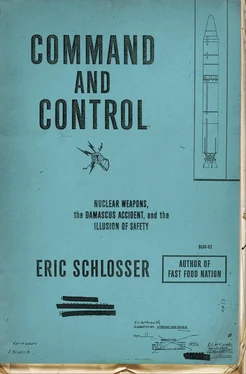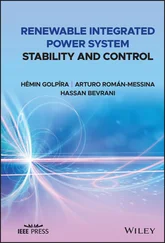All three of Childers’s siblings eventually served in the military. His older brother enlisted in the Army, his sister in the Air Force, his younger brother in the Navy. And all of them wound up with spouses who’d either served in the military or been raised in military families. Childers later realized that they’d been drawn back to a familiar way of life. It offered a good education, a sense of mission, the chance to do something useful, and a strong feeling of comradeship with others who’d chosen to serve.
In the hierarchy of Air Force officers, the fighter pilots and bomber pilots each claimed to be at the top. Despite their intense rivalry, the pilots agreed on at least one thing: missileers occupied a rung far below them. Serving in an underground control center lacked the glamour of flying sorties into enemy territory or gaining command of the skies. Childers’s poor eyesight disqualified him from becoming an Air Force pilot, and the missile corps needed officers. Although he knew nothing about intercontinental ballistic missiles (ICBMs) and even less about what a missile officer did, he signed up for the program before graduating from college. He didn’t care about the status or traditional Air Force snobbery. The job sounded interesting, and it offered the opportunity to command.
Childers spent six months studying Titan II operations at Sheppard Air Force Base in Texas and Vandenberg Air Force Base in California. Like all Titan II trainees, he carefully read the Dash-1, the technical manual that explained every aspect of the missile system. He spent hours in simulators, mock-ups of the control center where launch checklists and hazard checklists were practiced again and again. But he never saw a real Titan II missile until he pulled his first alert in Arkansas and stepped into the silo. It felt cold in there, like walking into a refrigerator, and the missile looked really big.
If an emergency war order arrived from SAC headquarters, every missile crew officer would face a decision with almost unimaginable consequences. Given the order to launch, Childers would comply without hesitation. He had no desire to commit mass murder. And yet the only thing that prevented the Soviet Union from destroying the United States with nuclear weapons, according to the Cold War theory of deterrence, was the threat of being annihilated, as well. Childers had faith in the logic of nuclear deterrence: his willingness to launch the missile ensured that it would never be launched. At Vandenberg he had learned the general categories and locations of Titan II targets. Some were in the Soviet Union, others in China. But a crew was never told where its missile was aimed. That sort of knowledge might inspire doubt. Like four members of a firing squad whose rifles were loaded with three bullets and one blank, a missile crew was expected to obey the order to fire, without bearing personal responsibility for the result.
After six weeks of training at Little Rock, Childers became the deputy commander of a Titan II site in 1979. The following year he was promoted, joining Mazzaro, Holder, and Fuller on an instructor crew. Unlike a typical crew that spent months or years pulling alerts at the same launch complex, an instructor crew brought trainees to different sites. On the morning of September 18, Childers and his crew were planning to bring a student, Second Lieutenant Miguel Serrano, to an overnight alert at Launch Complex 374-5, outside the town of Springhill. The crew always liked going to “4–5.” It was closer to the base than some of the other complexes, which meant they could get there faster and get home sooner the next day.
Predeparture briefings always started with a roll call. Once it was clear that every launch complex would be fully staffed, the wing’s senior officers talked to the eighty or so combat crew members about maintenance issues, new safety guidelines, changes in the emergency war order, and the latest weather report. The weather was a crucial factor in any maintenance work that involved fuel, oxidizer, or the reentry vehicle. Sometimes the briefings included a slide presentation on intelligence issues and the state of the world.
• • •
ON SEPTEMBER 18, 1980, the world was unsettled. The president of Iraq, Saddam Hussein, had announced the previous day that the treaty defining the border between his country and Iran was no longer in effect. Troops from the two nations were already fighting skirmishes in southern Khuzestan, Iran’s foreign ministry had condemned “the hostile invasion… by the Iraqi regime,” and a war over the disputed territory seemed imminent. In Tehran, fifty-two American hostages were still being held captive, almost a year after being seized at the U.S. embassy there. A failed rescue attempt by the U.S. military, during the spring of 1980, had prompted Iran’s Revolutionary Guards to remove the hostages from the embassy and scatter them at locations throughout the city. Televised images of Iranian crowds burning American flags and shouting “Death to the Great Satan!” had become a nightly routine, and the American government seemed powerless to do anything about it.
Meanwhile, relations between the United States and the Soviet Union had reached their lowest point since the Cuban Missile Crisis in 1962. The Soviets had invaded Afghanistan nine months earlier, deploying more than 100,000 troops in a campaign that many feared was just the first stage of a wider assault on the oil-producing nations of the Middle East. The United States had responded to the invasion by imposing a grain embargo on the Soviet Union and boycotting the recent Summer Olympics in Moscow. Neither of those punishments, however, seemed likely to force a Soviet withdrawal from Kabul. The influence of the United States seemed everywhere in decline. On September 17, the International Institute for Strategic Studies, a prominent British think tank, issued a report suggesting that the Soviet Union’s new and more accurate ICBMs had made America’s ICBMs vulnerable to attack. The United States was falling behind not only in nuclear weaponry, the report claimed, but also in planes, tanks, and ground forces.
Amid this discouraging international news, the mood of the American people seemed equally downbeat. The economy of the United States was in recession, with high inflation and an unemployment rate of about 8 percent. Gasoline shortages raised the prospect of rationing and federal limits on automobile use. Watergate, the Vietnam War, and the energy crisis had shaken faith in the ability of government to accomplish anything. The president of the United States, Jimmy Carter, had offered his own harsh critique of the national state of mind. During a speech broadcast by the three major television networks in prime time, the president warned that the United States faced an invisible threat: “a crisis in confidence.” Old-fashioned American optimism had been replaced by a despairing, self-absorbed worship of consumption. “Piling up material goods,” Carter said, “cannot fill the emptiness of lives which have no purpose or meaning.” The speech ended on a more practical note, outlining half a dozen steps to support renewable energy and eliminate the dependence on foreign oil. The underlying message, however, was that the nation’s most important problems could never be solved by Congress or the president, and Carter urged viewers to assume responsibility for their own fate. “All the legislation in the world,” he said, “can’t fix what’s wrong with America.”
Many Democrats and Republicans disagreed. They thought that Jimmy Carter was the problem, not some vague, existential crisis of the American soul. It was a presidential election year, and Carter had gained the Democratic nomination after a bitter primary fight with Senator Edward M. Kennedy. Despite the victory, Carter’s approval ratings plummeted. The Iranian hostage crisis brought more bad news every day, and an official report on the failed rescue attempt — describing how eight American servicemen died and half a dozen U.S. helicopters full of classified documents were abandoned in the desert — raised doubts about the readiness of the military. Although Carter was a devout Christian, a newly created evangelical group, the Moral Majority, was attacking his support for legalized abortion and a constitutional amendment to guarantee equal rights for women. A midsummer opinion poll found that 77 percent of the American people disapproved of President Carter’s performance in the White House — a higher disapproval rate than that of President Richard Nixon at the height of Watergate.
Читать дальше












